Managing Across Cultures: A Report on West Indies Yacht Club Issues
VerifiedAdded on 2022/10/01
|7
|1474
|122
Report
AI Summary
This report delves into the cultural challenges faced by the West Indies Yacht Club, examining how cultural differences affect management practices, employee motivation, and recruitment strategies. It analyzes the impact of these differences on the organization's operations and proposes solutions to improve employee relations and leadership effectiveness. The report explores the strengths and weaknesses of the current recruitment process and suggests modifications to ensure the right mix of skilled employees, including local talent. It assesses the effectiveness of current motivation strategies and identifies key issues affecting staff morale and performance. Furthermore, the report analyzes the leadership styles of key managers within the club, providing recommendations to Dowd for addressing the identified problems and improving overall organizational performance. The report highlights the importance of understanding cultural nuances in international business settings and emphasizes the need for effective cross-cultural management to achieve organizational goals.
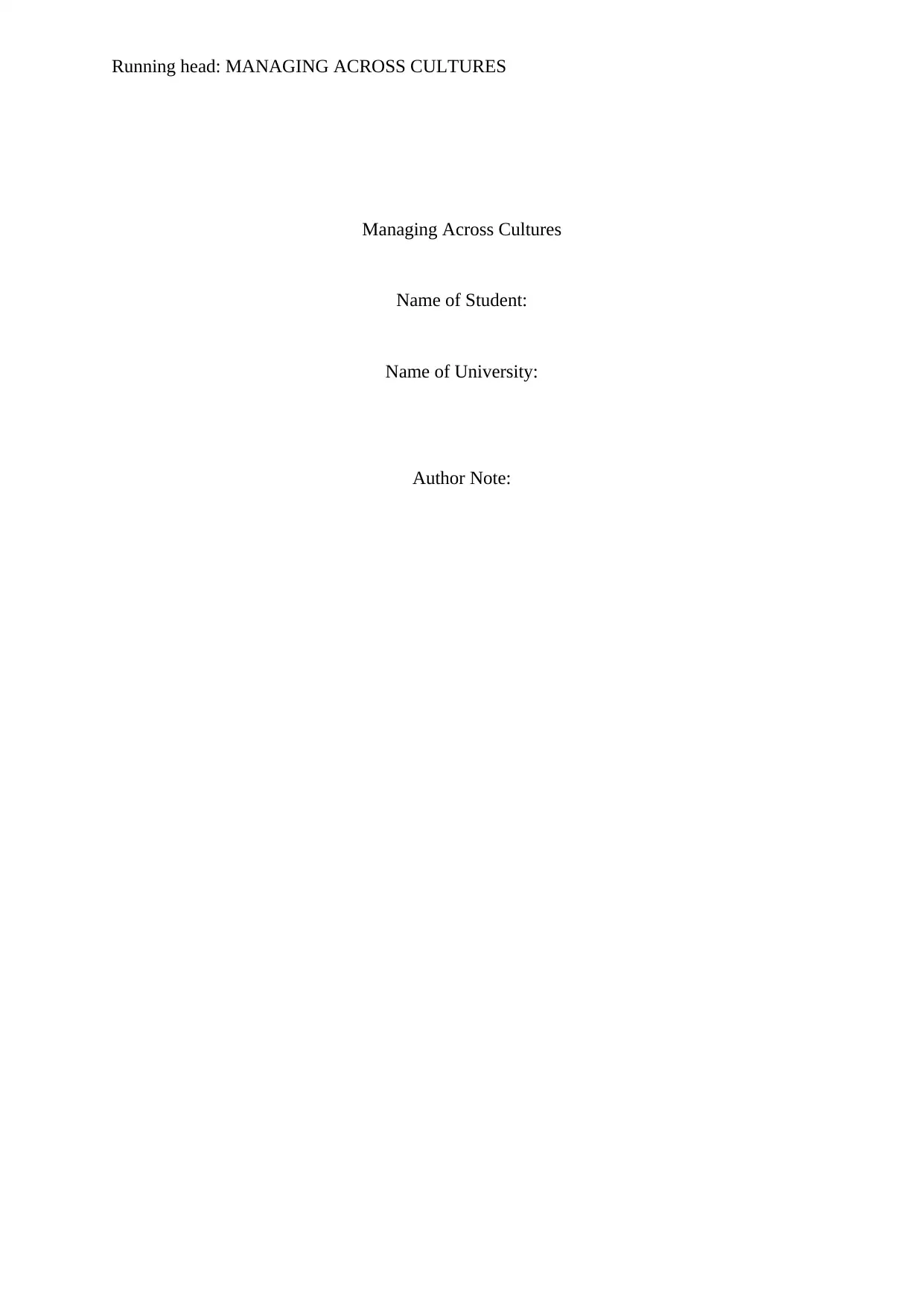
Running head: MANAGING ACROSS CULTURES
Managing Across Cultures
Name of Student:
Name of University:
Author Note:
Managing Across Cultures
Name of Student:
Name of University:
Author Note:
Paraphrase This Document
Need a fresh take? Get an instant paraphrase of this document with our AI Paraphraser
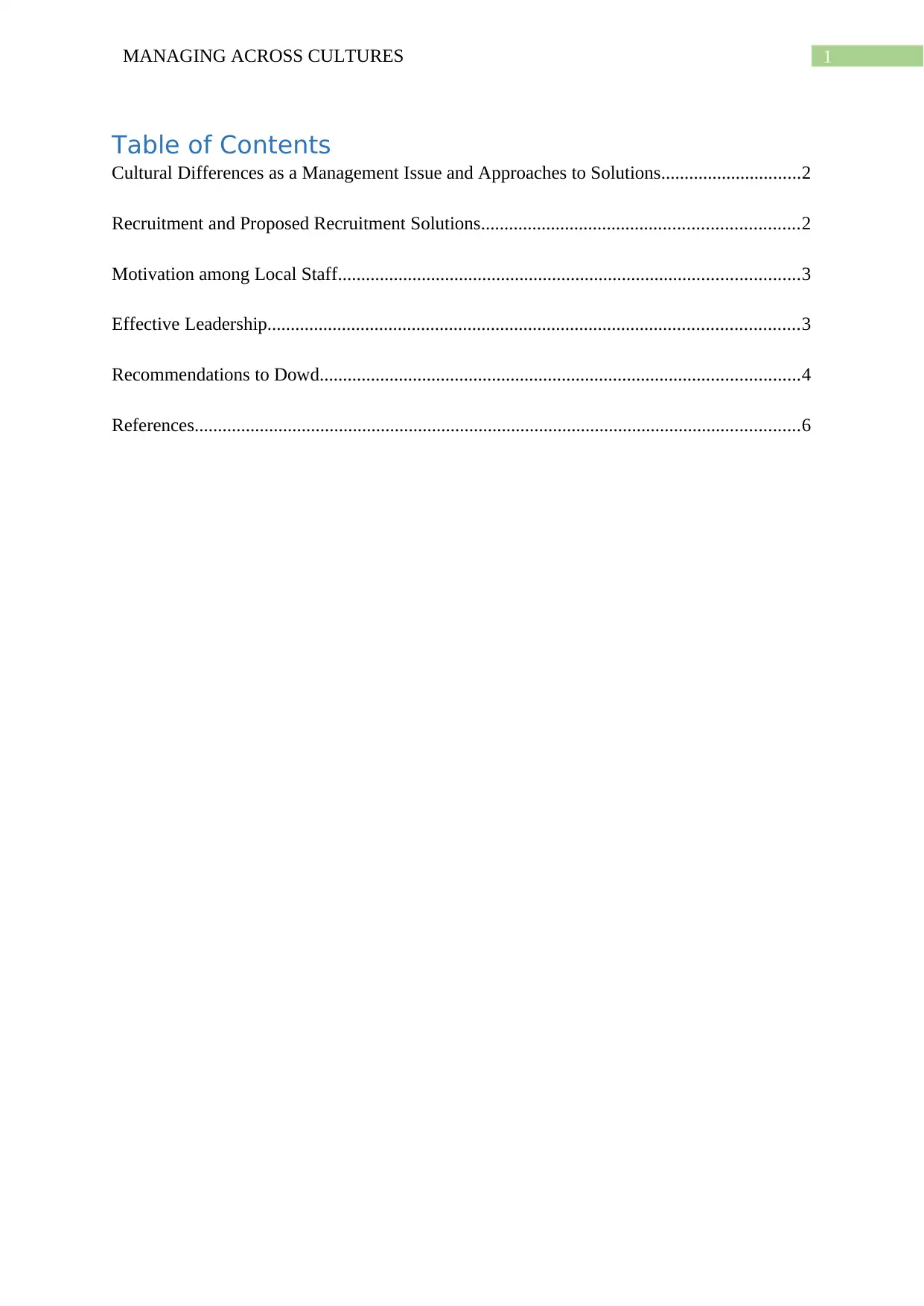
1MANAGING ACROSS CULTURES
Table of Contents
Cultural Differences as a Management Issue and Approaches to Solutions..............................2
Recruitment and Proposed Recruitment Solutions....................................................................2
Motivation among Local Staff...................................................................................................3
Effective Leadership..................................................................................................................3
Recommendations to Dowd.......................................................................................................4
References..................................................................................................................................6
Table of Contents
Cultural Differences as a Management Issue and Approaches to Solutions..............................2
Recruitment and Proposed Recruitment Solutions....................................................................2
Motivation among Local Staff...................................................................................................3
Effective Leadership..................................................................................................................3
Recommendations to Dowd.......................................................................................................4
References..................................................................................................................................6
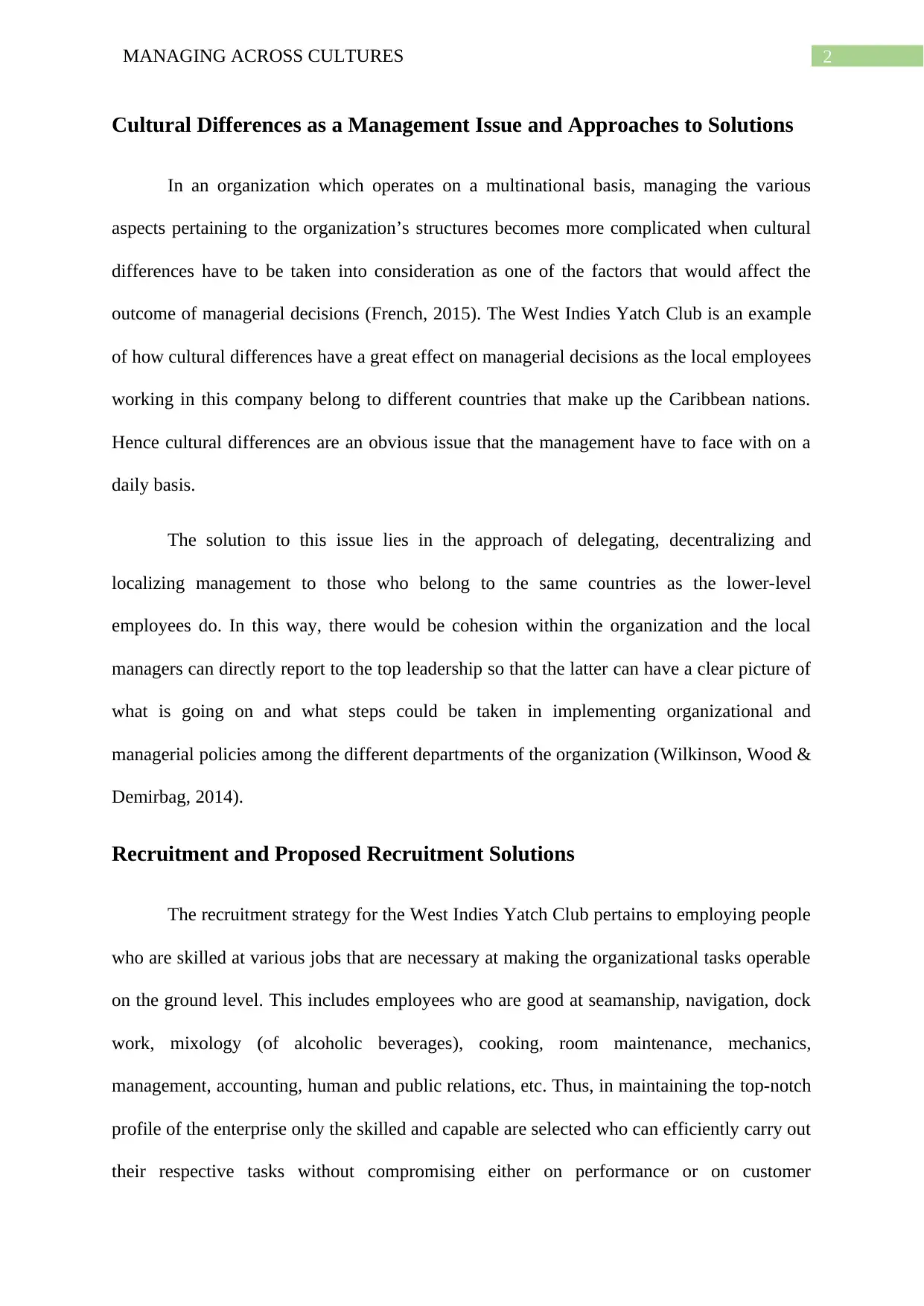
2MANAGING ACROSS CULTURES
Cultural Differences as a Management Issue and Approaches to Solutions
In an organization which operates on a multinational basis, managing the various
aspects pertaining to the organization’s structures becomes more complicated when cultural
differences have to be taken into consideration as one of the factors that would affect the
outcome of managerial decisions (French, 2015). The West Indies Yatch Club is an example
of how cultural differences have a great effect on managerial decisions as the local employees
working in this company belong to different countries that make up the Caribbean nations.
Hence cultural differences are an obvious issue that the management have to face with on a
daily basis.
The solution to this issue lies in the approach of delegating, decentralizing and
localizing management to those who belong to the same countries as the lower-level
employees do. In this way, there would be cohesion within the organization and the local
managers can directly report to the top leadership so that the latter can have a clear picture of
what is going on and what steps could be taken in implementing organizational and
managerial policies among the different departments of the organization (Wilkinson, Wood &
Demirbag, 2014).
Recruitment and Proposed Recruitment Solutions
The recruitment strategy for the West Indies Yatch Club pertains to employing people
who are skilled at various jobs that are necessary at making the organizational tasks operable
on the ground level. This includes employees who are good at seamanship, navigation, dock
work, mixology (of alcoholic beverages), cooking, room maintenance, mechanics,
management, accounting, human and public relations, etc. Thus, in maintaining the top-notch
profile of the enterprise only the skilled and capable are selected who can efficiently carry out
their respective tasks without compromising either on performance or on customer
Cultural Differences as a Management Issue and Approaches to Solutions
In an organization which operates on a multinational basis, managing the various
aspects pertaining to the organization’s structures becomes more complicated when cultural
differences have to be taken into consideration as one of the factors that would affect the
outcome of managerial decisions (French, 2015). The West Indies Yatch Club is an example
of how cultural differences have a great effect on managerial decisions as the local employees
working in this company belong to different countries that make up the Caribbean nations.
Hence cultural differences are an obvious issue that the management have to face with on a
daily basis.
The solution to this issue lies in the approach of delegating, decentralizing and
localizing management to those who belong to the same countries as the lower-level
employees do. In this way, there would be cohesion within the organization and the local
managers can directly report to the top leadership so that the latter can have a clear picture of
what is going on and what steps could be taken in implementing organizational and
managerial policies among the different departments of the organization (Wilkinson, Wood &
Demirbag, 2014).
Recruitment and Proposed Recruitment Solutions
The recruitment strategy for the West Indies Yatch Club pertains to employing people
who are skilled at various jobs that are necessary at making the organizational tasks operable
on the ground level. This includes employees who are good at seamanship, navigation, dock
work, mixology (of alcoholic beverages), cooking, room maintenance, mechanics,
management, accounting, human and public relations, etc. Thus, in maintaining the top-notch
profile of the enterprise only the skilled and capable are selected who can efficiently carry out
their respective tasks without compromising either on performance or on customer
⊘ This is a preview!⊘
Do you want full access?
Subscribe today to unlock all pages.

Trusted by 1+ million students worldwide
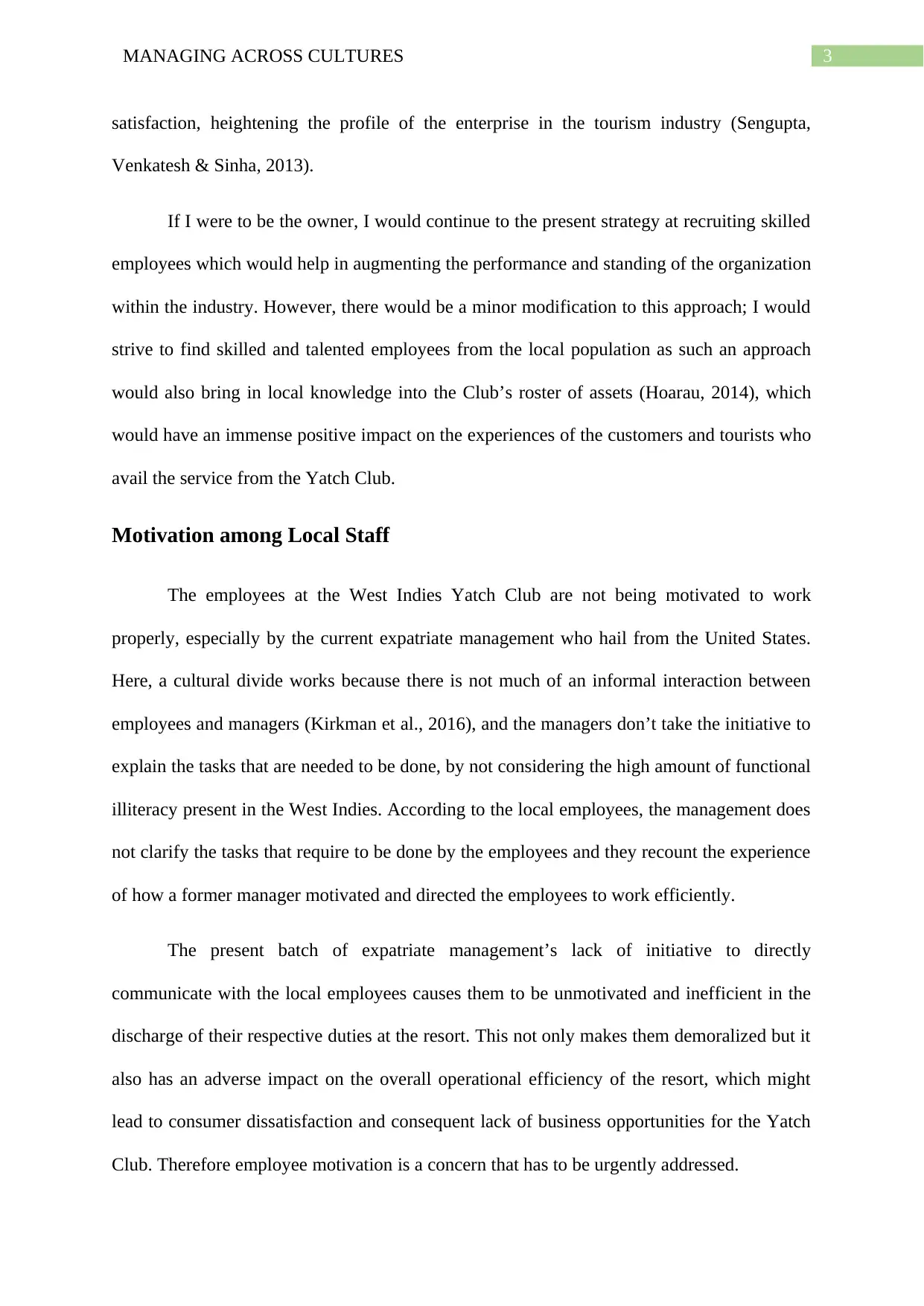
3MANAGING ACROSS CULTURES
satisfaction, heightening the profile of the enterprise in the tourism industry (Sengupta,
Venkatesh & Sinha, 2013).
If I were to be the owner, I would continue to the present strategy at recruiting skilled
employees which would help in augmenting the performance and standing of the organization
within the industry. However, there would be a minor modification to this approach; I would
strive to find skilled and talented employees from the local population as such an approach
would also bring in local knowledge into the Club’s roster of assets (Hoarau, 2014), which
would have an immense positive impact on the experiences of the customers and tourists who
avail the service from the Yatch Club.
Motivation among Local Staff
The employees at the West Indies Yatch Club are not being motivated to work
properly, especially by the current expatriate management who hail from the United States.
Here, a cultural divide works because there is not much of an informal interaction between
employees and managers (Kirkman et al., 2016), and the managers don’t take the initiative to
explain the tasks that are needed to be done, by not considering the high amount of functional
illiteracy present in the West Indies. According to the local employees, the management does
not clarify the tasks that require to be done by the employees and they recount the experience
of how a former manager motivated and directed the employees to work efficiently.
The present batch of expatriate management’s lack of initiative to directly
communicate with the local employees causes them to be unmotivated and inefficient in the
discharge of their respective duties at the resort. This not only makes them demoralized but it
also has an adverse impact on the overall operational efficiency of the resort, which might
lead to consumer dissatisfaction and consequent lack of business opportunities for the Yatch
Club. Therefore employee motivation is a concern that has to be urgently addressed.
satisfaction, heightening the profile of the enterprise in the tourism industry (Sengupta,
Venkatesh & Sinha, 2013).
If I were to be the owner, I would continue to the present strategy at recruiting skilled
employees which would help in augmenting the performance and standing of the organization
within the industry. However, there would be a minor modification to this approach; I would
strive to find skilled and talented employees from the local population as such an approach
would also bring in local knowledge into the Club’s roster of assets (Hoarau, 2014), which
would have an immense positive impact on the experiences of the customers and tourists who
avail the service from the Yatch Club.
Motivation among Local Staff
The employees at the West Indies Yatch Club are not being motivated to work
properly, especially by the current expatriate management who hail from the United States.
Here, a cultural divide works because there is not much of an informal interaction between
employees and managers (Kirkman et al., 2016), and the managers don’t take the initiative to
explain the tasks that are needed to be done, by not considering the high amount of functional
illiteracy present in the West Indies. According to the local employees, the management does
not clarify the tasks that require to be done by the employees and they recount the experience
of how a former manager motivated and directed the employees to work efficiently.
The present batch of expatriate management’s lack of initiative to directly
communicate with the local employees causes them to be unmotivated and inefficient in the
discharge of their respective duties at the resort. This not only makes them demoralized but it
also has an adverse impact on the overall operational efficiency of the resort, which might
lead to consumer dissatisfaction and consequent lack of business opportunities for the Yatch
Club. Therefore employee motivation is a concern that has to be urgently addressed.
Paraphrase This Document
Need a fresh take? Get an instant paraphrase of this document with our AI Paraphraser
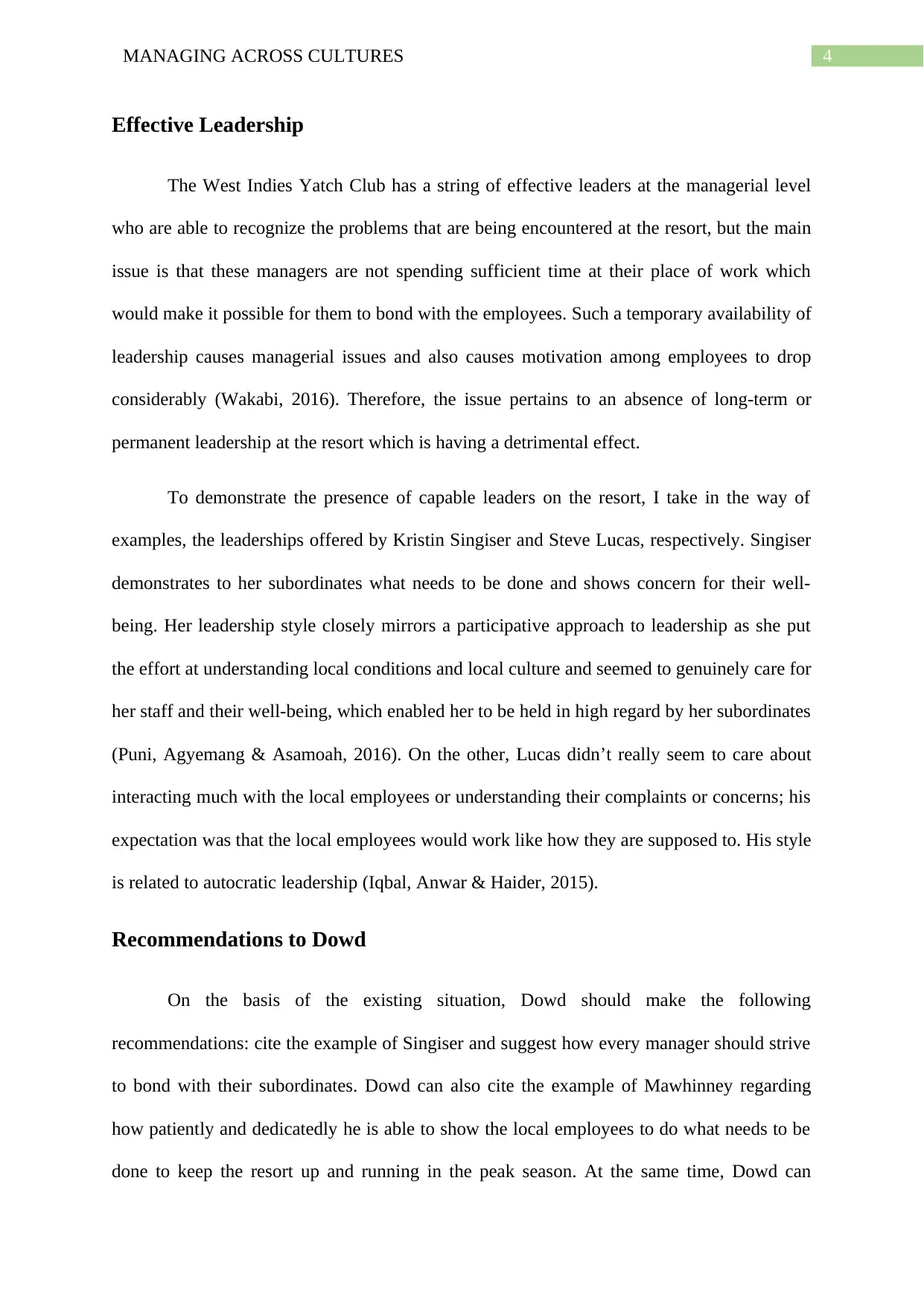
4MANAGING ACROSS CULTURES
Effective Leadership
The West Indies Yatch Club has a string of effective leaders at the managerial level
who are able to recognize the problems that are being encountered at the resort, but the main
issue is that these managers are not spending sufficient time at their place of work which
would make it possible for them to bond with the employees. Such a temporary availability of
leadership causes managerial issues and also causes motivation among employees to drop
considerably (Wakabi, 2016). Therefore, the issue pertains to an absence of long-term or
permanent leadership at the resort which is having a detrimental effect.
To demonstrate the presence of capable leaders on the resort, I take in the way of
examples, the leaderships offered by Kristin Singiser and Steve Lucas, respectively. Singiser
demonstrates to her subordinates what needs to be done and shows concern for their well-
being. Her leadership style closely mirrors a participative approach to leadership as she put
the effort at understanding local conditions and local culture and seemed to genuinely care for
her staff and their well-being, which enabled her to be held in high regard by her subordinates
(Puni, Agyemang & Asamoah, 2016). On the other, Lucas didn’t really seem to care about
interacting much with the local employees or understanding their complaints or concerns; his
expectation was that the local employees would work like how they are supposed to. His style
is related to autocratic leadership (Iqbal, Anwar & Haider, 2015).
Recommendations to Dowd
On the basis of the existing situation, Dowd should make the following
recommendations: cite the example of Singiser and suggest how every manager should strive
to bond with their subordinates. Dowd can also cite the example of Mawhinney regarding
how patiently and dedicatedly he is able to show the local employees to do what needs to be
done to keep the resort up and running in the peak season. At the same time, Dowd can
Effective Leadership
The West Indies Yatch Club has a string of effective leaders at the managerial level
who are able to recognize the problems that are being encountered at the resort, but the main
issue is that these managers are not spending sufficient time at their place of work which
would make it possible for them to bond with the employees. Such a temporary availability of
leadership causes managerial issues and also causes motivation among employees to drop
considerably (Wakabi, 2016). Therefore, the issue pertains to an absence of long-term or
permanent leadership at the resort which is having a detrimental effect.
To demonstrate the presence of capable leaders on the resort, I take in the way of
examples, the leaderships offered by Kristin Singiser and Steve Lucas, respectively. Singiser
demonstrates to her subordinates what needs to be done and shows concern for their well-
being. Her leadership style closely mirrors a participative approach to leadership as she put
the effort at understanding local conditions and local culture and seemed to genuinely care for
her staff and their well-being, which enabled her to be held in high regard by her subordinates
(Puni, Agyemang & Asamoah, 2016). On the other, Lucas didn’t really seem to care about
interacting much with the local employees or understanding their complaints or concerns; his
expectation was that the local employees would work like how they are supposed to. His style
is related to autocratic leadership (Iqbal, Anwar & Haider, 2015).
Recommendations to Dowd
On the basis of the existing situation, Dowd should make the following
recommendations: cite the example of Singiser and suggest how every manager should strive
to bond with their subordinates. Dowd can also cite the example of Mawhinney regarding
how patiently and dedicatedly he is able to show the local employees to do what needs to be
done to keep the resort up and running in the peak season. At the same time, Dowd can
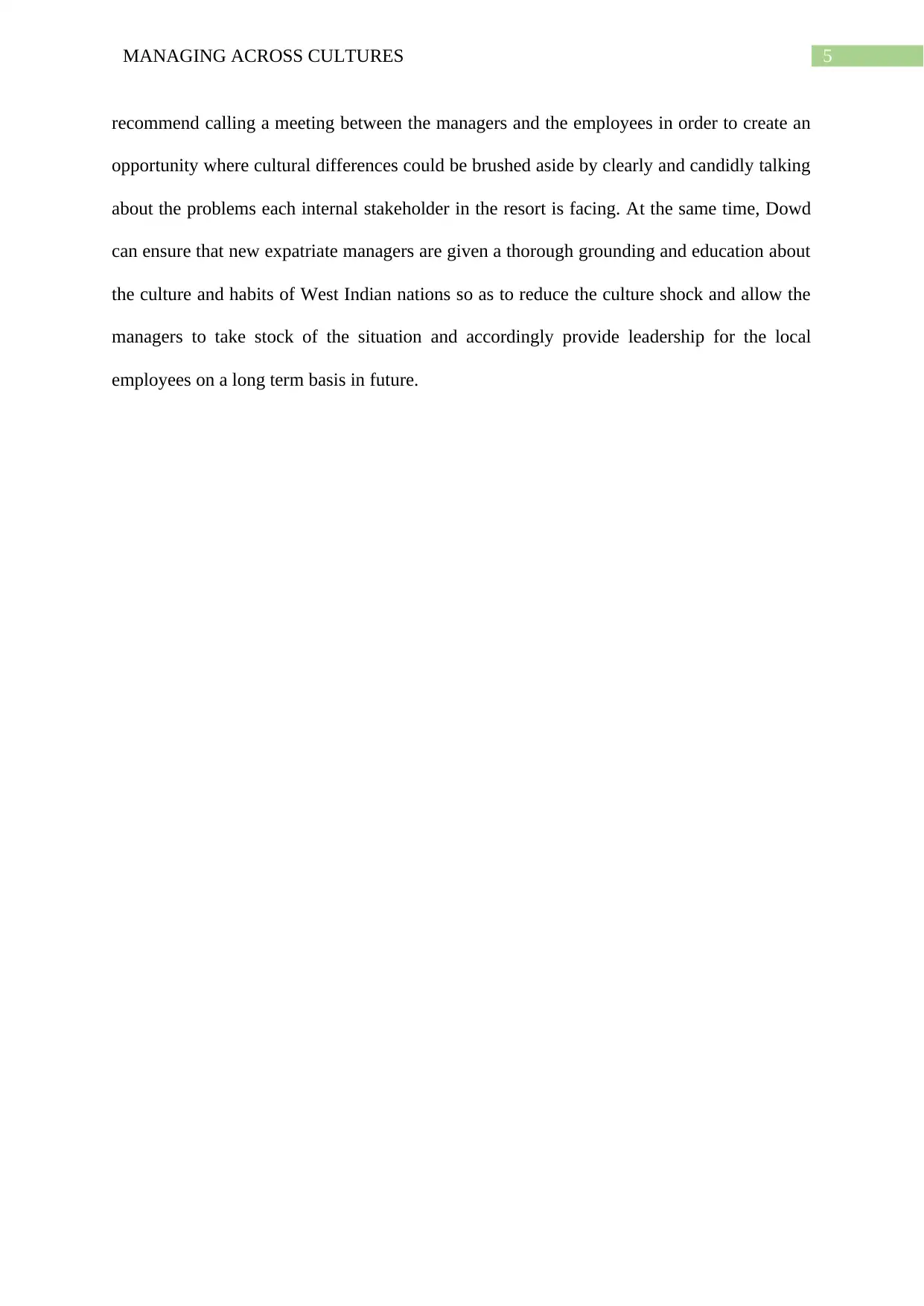
5MANAGING ACROSS CULTURES
recommend calling a meeting between the managers and the employees in order to create an
opportunity where cultural differences could be brushed aside by clearly and candidly talking
about the problems each internal stakeholder in the resort is facing. At the same time, Dowd
can ensure that new expatriate managers are given a thorough grounding and education about
the culture and habits of West Indian nations so as to reduce the culture shock and allow the
managers to take stock of the situation and accordingly provide leadership for the local
employees on a long term basis in future.
recommend calling a meeting between the managers and the employees in order to create an
opportunity where cultural differences could be brushed aside by clearly and candidly talking
about the problems each internal stakeholder in the resort is facing. At the same time, Dowd
can ensure that new expatriate managers are given a thorough grounding and education about
the culture and habits of West Indian nations so as to reduce the culture shock and allow the
managers to take stock of the situation and accordingly provide leadership for the local
employees on a long term basis in future.
⊘ This is a preview!⊘
Do you want full access?
Subscribe today to unlock all pages.

Trusted by 1+ million students worldwide
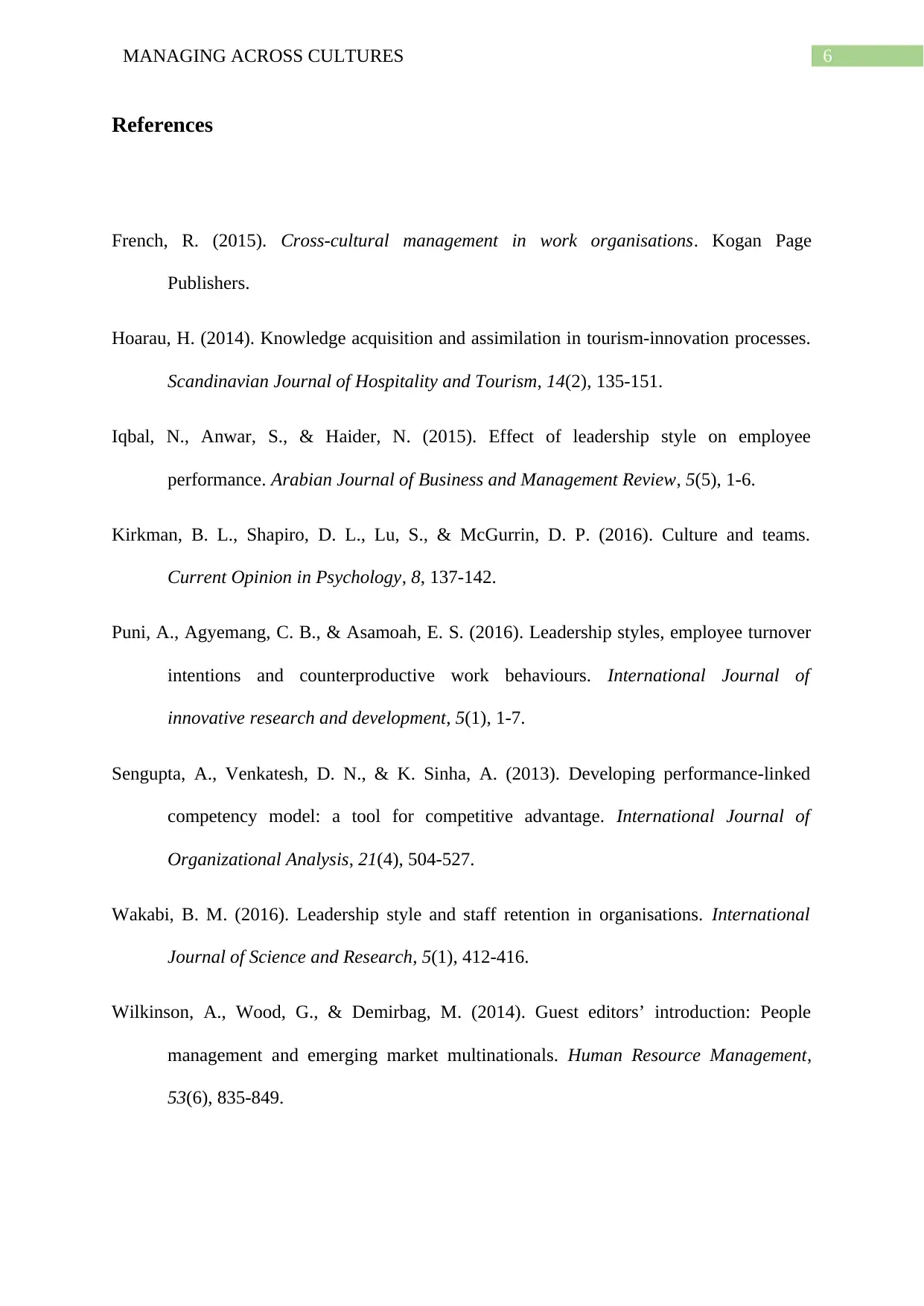
6MANAGING ACROSS CULTURES
References
French, R. (2015). Cross-cultural management in work organisations. Kogan Page
Publishers.
Hoarau, H. (2014). Knowledge acquisition and assimilation in tourism-innovation processes.
Scandinavian Journal of Hospitality and Tourism, 14(2), 135-151.
Iqbal, N., Anwar, S., & Haider, N. (2015). Effect of leadership style on employee
performance. Arabian Journal of Business and Management Review, 5(5), 1-6.
Kirkman, B. L., Shapiro, D. L., Lu, S., & McGurrin, D. P. (2016). Culture and teams.
Current Opinion in Psychology, 8, 137-142.
Puni, A., Agyemang, C. B., & Asamoah, E. S. (2016). Leadership styles, employee turnover
intentions and counterproductive work behaviours. International Journal of
innovative research and development, 5(1), 1-7.
Sengupta, A., Venkatesh, D. N., & K. Sinha, A. (2013). Developing performance-linked
competency model: a tool for competitive advantage. International Journal of
Organizational Analysis, 21(4), 504-527.
Wakabi, B. M. (2016). Leadership style and staff retention in organisations. International
Journal of Science and Research, 5(1), 412-416.
Wilkinson, A., Wood, G., & Demirbag, M. (2014). Guest editors’ introduction: People
management and emerging market multinationals. Human Resource Management,
53(6), 835-849.
References
French, R. (2015). Cross-cultural management in work organisations. Kogan Page
Publishers.
Hoarau, H. (2014). Knowledge acquisition and assimilation in tourism-innovation processes.
Scandinavian Journal of Hospitality and Tourism, 14(2), 135-151.
Iqbal, N., Anwar, S., & Haider, N. (2015). Effect of leadership style on employee
performance. Arabian Journal of Business and Management Review, 5(5), 1-6.
Kirkman, B. L., Shapiro, D. L., Lu, S., & McGurrin, D. P. (2016). Culture and teams.
Current Opinion in Psychology, 8, 137-142.
Puni, A., Agyemang, C. B., & Asamoah, E. S. (2016). Leadership styles, employee turnover
intentions and counterproductive work behaviours. International Journal of
innovative research and development, 5(1), 1-7.
Sengupta, A., Venkatesh, D. N., & K. Sinha, A. (2013). Developing performance-linked
competency model: a tool for competitive advantage. International Journal of
Organizational Analysis, 21(4), 504-527.
Wakabi, B. M. (2016). Leadership style and staff retention in organisations. International
Journal of Science and Research, 5(1), 412-416.
Wilkinson, A., Wood, G., & Demirbag, M. (2014). Guest editors’ introduction: People
management and emerging market multinationals. Human Resource Management,
53(6), 835-849.
1 out of 7
Related Documents
Your All-in-One AI-Powered Toolkit for Academic Success.
+13062052269
info@desklib.com
Available 24*7 on WhatsApp / Email
![[object Object]](/_next/static/media/star-bottom.7253800d.svg)
Unlock your academic potential
Copyright © 2020–2025 A2Z Services. All Rights Reserved. Developed and managed by ZUCOL.





